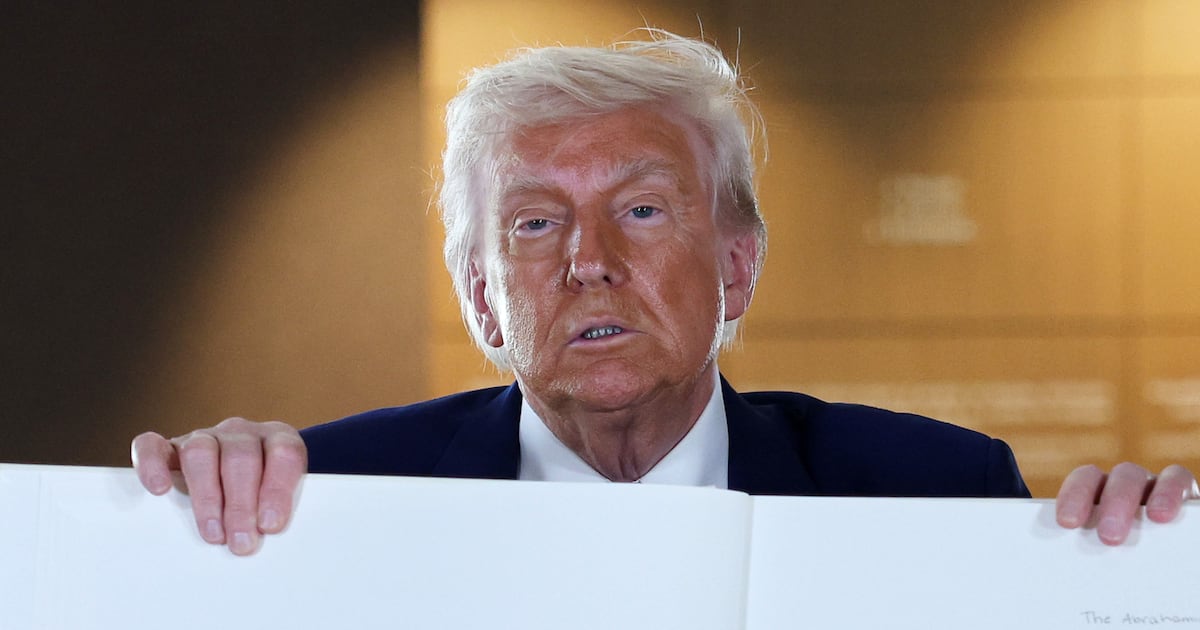
This campaign has been full of electric moments, but the voltage has never been higher than it was just before midnight on Wednesday in Kissimmee, Florida, when Bill Clinton and Barack Obama at last shared a stage before a crowd of 35,000 that stretched endlessly into the expectant darkness. It’s taken this long for both men to overcome their mutual resentment and antipathy.
Ever since Hillary lost, the ex-president has been volcanic in his fury about the many ways he feels tarnished and disrespected by the Obama campaign.
He considered the new Democratic messiah to be a fraud, short on ideas and allowed to maintain an above-the-fray myth by a gullible, in-the-tank media. He still smarts at the way Obama played—or trumped—the race card on him in South Carolina. And he was enraged that throughout the campaign The One so seldom acknowledged the political and economic achievements of the Clinton years.
Next to Clinton’s fleshly vitality, Obama seemed suddenly insubstantial, secondary. He watched warily from his stool like a young lounge singer at Caesars Palace who lingers in the wings to watch Elvis bring the house down.
Obama, meanwhile, harbored Freudian anxieties about Clinton that went beyond anger at the extended battering Hillary gave him in the race. Belonging everywhere and nowhere, Obama is uncomfortable with Clinton’s rooted Southern authenticity. If Obama’s extraordinary life story has been defined by dreams and longings for a missing father, Bill Clinton became the all-too-present father who refused to go missing. Wasn’t it time to give the overbearing old roué the hook? But Clinton had reinvented the Democratic Party, turning its face toward the center. He had drawn some of the poison from race by embracing welfare reform. He had made Democrats the party of economic competence. Would Obama really be where he was without Clinton’s record?
When you combine all this with the testosterone tensions of alpha-male rivalry, Thursday night in the Clinton-Obama story was huge.
The Florida moment, however, yielded something surprising . We assumed Clinton would be outshone, outclassed, made to look retro next to Obama’s quintessentially modern mystique. But that’s not what happened at all.
Next to Clinton’s fleshly vitality, his in-your-face humanity, Obama seemed suddenly insubstantial, secondary. He watched warily from his stool like a young lounge singer at Caesars Palace who lingers in the wings to watch Elvis bring the house down. Not the slender early Elvis, not the puffy late Elvis—the mid-period Elvis, bouncy and sequined. Obama’s expression said: ah, this is how it’s done. When it was his turn to speak he was dull and off-form, his eyes drooping with fatigue.
Obama is a great oral essayist. His speeches have the elegance and control of a Haydn concerto. But Clinton has this amazing gift of bringing the talking points to raw, immediate life.
When he talks about health care he sounds genuinely outraged. When he says with that knowing smile, “We want a president to understand and who can understand…,” all the ignorance of his hapless successor is rendered in the subtext.
I watched him do this magic act again and again when he stumped for Hillary in North Carolina in April. At the time he was truly in the doghouse, banished to the boonies—“the designated ambassador to small town communities,” as he put it wryly—by all those boomeranging sound bites.
Hillary’s press operation wasn’t disclosing her husband’s location. In Dunn, in Lumberton, in Whiteville—in towns where celebrities are seen on TV or not at all—Clinton would just pop up on the porches of rented frame houses and small train stations, his presence announced a few hours before by flyers and emails.
You could see office workers looking up at the windows or waitresses emerging from diners wearing their aprons as they saw to their amazement that one of the most famous people in the world was in the town square and was standing there talking.
Except it wasn't just talking. It was a style of syncopated communication—a dazzling wonk-jam, 45 minutes of wide-ranging, fact-packed reviews of failed Bush policies. His riffs were never dry or hard to follow because he filled them with anecdotes about people he’d met and tossed in folksy metaphors and mock-wondering hayseed asides that made the small crowds laugh even as they nodded in affirmation. (One gem I remember was his explanation of the connection between the Bush deficit and unenforced trade deals, a subject that’s not inherently crowd-pleasing: “Do you think if you went into the bank right now and slapped the living daylights out of the bank manager, you could get a loan the next morning?”) At the end of the event you could see his snowy head plunging into the crowd like a dolphin in the surf, bobbing among the fans who clustered around him brandishing a book to sign. The only signifiers of his old life in the White House were the unyielding figures of his Secret Service detail that flanked him as he weaved and dived among townsfolk who’d never seen a president in person before and probably never would again.
On Thursday, when Obama at last bowed to that superior skill, it was a satisfying time-out for Bill Clinton. In the end, The One sought The Natural’s special magnetism to help him close the deal. And he will seek it again. Obama put it this way: “I know how much we’ll need both Hillary Clinton and Bill Clinton in the months and years to come.” Once he'd brought himself to say it, he seemed to mean it. It was Clinton’s turn to look pensive on the stool. Now the score is settled, the Big Dog can finally accept that the whippet is the winner.




